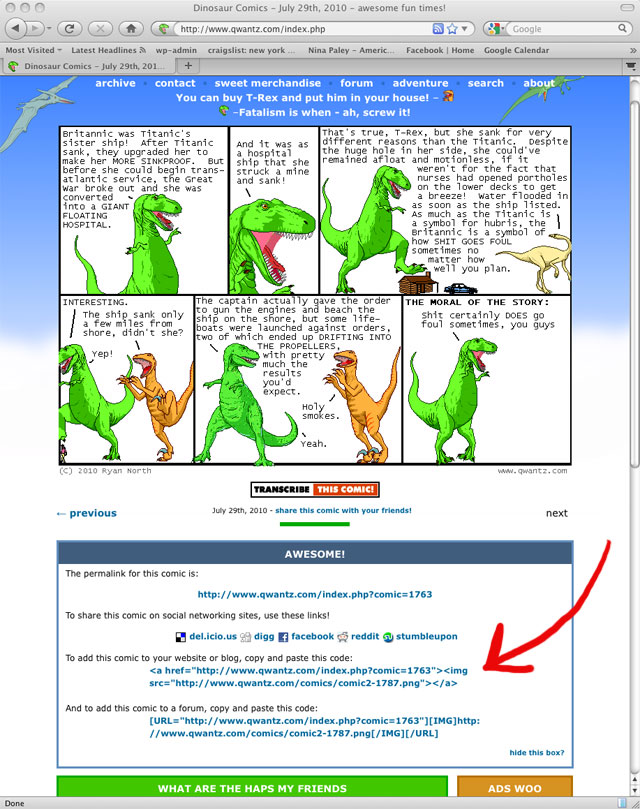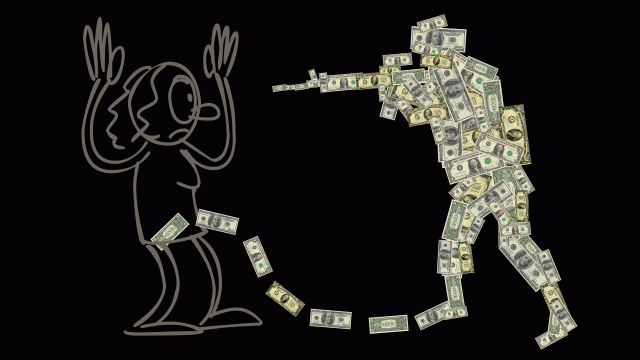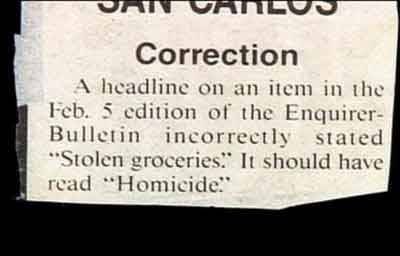Adapted from a talk and slide show I presented at the Open Knowledge Conference in Berlin on July 1, 2011. –NP
Why are the Freedoms guaranteed for Free Software not guaranteed for Free Culture?
Free software is a matter of the users’ freedom to run, copy, distribute, study, change and improve the software. More precisely, it means that the program’s users have the four essential freedoms:
- The freedom to run the program, for any purpose (freedom 0).
- The freedom to study how the program works, and change it to make it do what you wish (freedom 1). Access to the source code is a precondition for this.
- The freedom to redistribute copies so you can help your neighbor (freedom 2).
- The freedom to distribute copies of your modified versions to others (freedom 3). By doing this you can give the whole community a chance to benefit from your changes. Access to the source code is a precondition for this.
These are the Four Freedoms of Free Software. They are foundational principles, and they are exactly right. They have served and continue to serve the Free Software Movement very well. They place the user’s freedom ahead of all other concerns. Free Software is a principled movement, but Free Culture is not – at least not so far. Why?
1. The No Derivatives (-ND) Restriction
If you tinker with software, you can improve it. You can also break it or make it worse, but the Freedom to Tinker is one of the foundational 4 Freedoms of Free Software. Your software may also be used for purposes you don’t like, used by “bad people,” or even used against you; the Four Freedoms wisely counsel us to GET OVER IT.
Unfortunately, The Free Software Foundation does not extend “Freedom to Tinker” to Culture:
Cultural works released by the Free Software Foundation come with “No Derivatives” restrictions. They rationalize it here:
Works that express someone’s opinion—memoirs, editorials, and so on—serve a fundamentally different purpose than works for practical use like software and documentation. Because of this, we expect them to provide recipients with a different set of permissions (notice how users are now called “recipients,” and their Freedoms are now called “permissions” –NP): just the permission to copy and distribute the work verbatim. (link)
The problem with this is that it is dead wrong. You do not know what purposes your works might serve others. You do not know how works might be found “practical” by others. To claim to understand the limits of “utility” of cultural works betrays an irrational bias toward software and against all other creative work. It is anti-Art, valuing software above the rest of culture. It says coders alone are entitled to Freedom, but everyone else can suck it. Use of -ND restrictions is an unjustifiable infringement on the freedom of others.
For example, here I have violated the Free Software Foundation’s No-Derivatives license:
The Four Freedoms of Free Culture:
1. The freedom to run, view, hear, read, play, perform, or otherwise attend to the Work;
2. The freedom to study, analyze, and dissect copies of the Work, and adapt it to your needs;
3. The freedom to redistribute copies so you can help your neighbor;
4. The freedom to distribute copies of your modified versions to others. By doing this you can give the whole community a chance to benefit from your changes.
(link)
Without permission, I’ve created a derivative work: the Four Freedoms of Free Culture. Although I violated FSF’s No-Derivatives license, they violated Freedoms # 2 and 4, so we’re even.
2. The Non-Commercial (-NC) Restriction
The Freedom to Distribute Free Software is essential to its success. It has given rise to many for-profit businesses that benefit the larger community.
Red Hat, Canonical – would the world be better if such companies were forbidden? Would Free Software benefit from a ban on those businesses? 
Yet the Cultural ecosystem is stunted by the prevalence of Non-Commercial restrictions. These maintain commercial monopolies around works, and – especially for vocational artists like me – are functionally as restrictive as unmodified copyright. Yet they are widely mislabeled “Free Culture,” or even “Copyleft.”
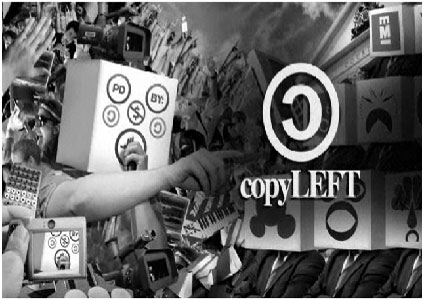
This is a still from the mostly excellent and popular documentary RIP:a Remix Manifesto. This film is many peoples’ introduction to the term “Free Culture” and “Copyleft.” But as you can see, the Non-Commercial restriction is lumped in with actual Free license terms.
See that dollar sign with the slash in it? That means Non-Commercial restrictions, which are most definitely NOT Copyleft. (I’ve posted about Creative Commons’ branding confusion before, but it’s only gotten worse since then.)
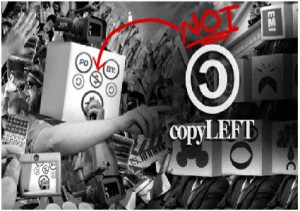
This film is itself licensed under unFree Non-Commercial restrictions. As an artist and filmmaker, I have found confusion is rampant among my creative colleagues. Some filmmakers are beginning to think the term “Free Culture” is cool, but they still want to restrict others’ freedom and impose commercial monopolies on their works.
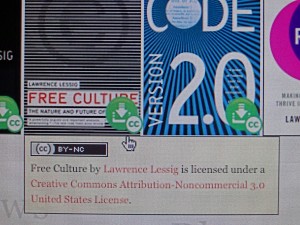
The book Free Culture by Lawrence Lessig its itself not Free culure, but it is widely looked up to. It sets an unfortunate and confusing example with its Non-Commercial license. It illustrates the absence of guiding principles in the Free Culture movement.
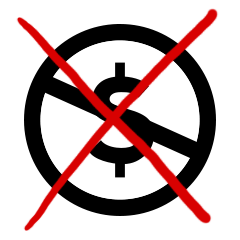 I have spoken to many artists who insist there’s “no real difference” between Non-Commercial licenses and Free alternatives. Yet these differences are well known and unacceptable in Free Software, for good reason.
I have spoken to many artists who insist there’s “no real difference” between Non-Commercial licenses and Free alternatives. Yet these differences are well known and unacceptable in Free Software, for good reason.
Calling Non-Commercial restrictions “Free Culture” neuters what could be an effective movement, if it only had principles.
So what do I want?
I want a PRINCIPLED Free Culture Movement.
I want Free Software people to take Culture seriously. I want a Free Culture movement guided by principles of Freedom, just as the Free Software movement is guided by principles of Freedom. I want a name I can use that means something – the phrase “Free Culture” is increasingly meaningless, as it is often applied to unFree practices, and is also the name of a famous book that is itself encumbered with Non-Commercial restrictions.
I want a Free Culture ecosystem that allows artists to make money. I want anyone to be able to accept money for their work of remixing and building on Culture – just as a trucker can accept money for driving on a road. I want money to be among the many incentives to participate in building culture. Without the freedoms to Tinker and Redistribute without restriction, there is little incentive to build on and improve cultural works. There is little reward to help your neighbor, when you are guaranteed to lose money doing so. “Free Culture” with non-Commercial restrictions will remain a hobby for those with a surplus of time and labor, and those who only accept money from monopolists.
I want commerce without monopolies. I want people to understand the difference.
I want a Free Culture ecosystem that includes equivalents of businesses like Red Hat and Canonical. I want cultural businesses that give back to their communities, that work with their customers instead of against them. Only if we refuse to place Non-Commercial and No-Derivatives restrictions on our works will a robust Free Culture ecosystem be able to emerge.
I want the Free Software community – those who currently best understand the Four Freedoms – to champion the rest of Culture, not just Software. I want Freedom for All.




